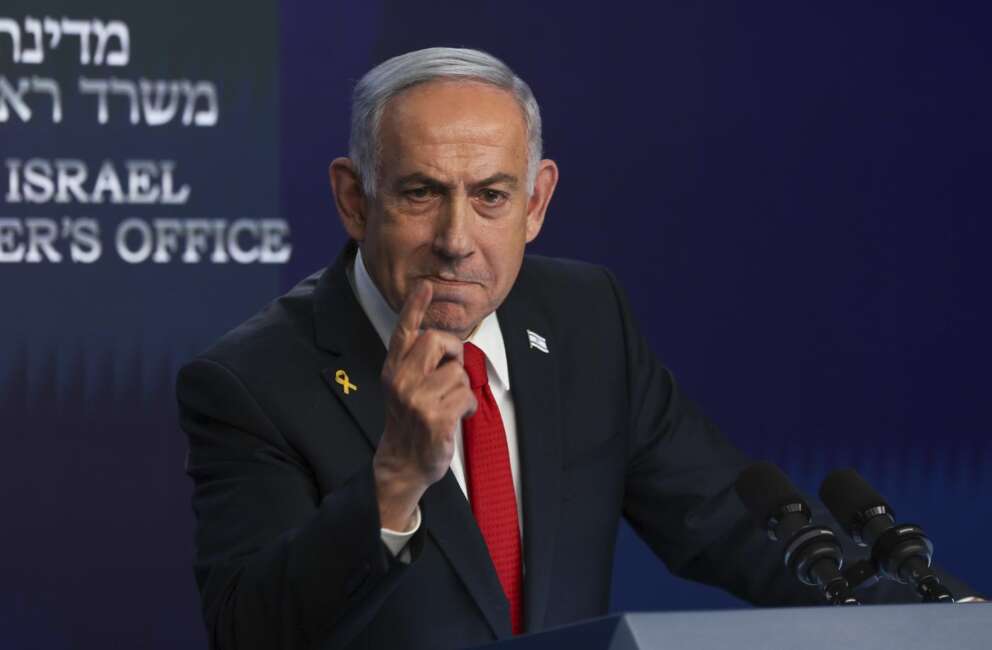Europe condemns Netanyahu, only Meloni's Italy stands by Bibi

Italy defends the agreement
In Parliament it is time for motions on Gaza, but Meloni and Tajani sneak away to avoid making a fool of themselves. Conte and Schlein attack: "You are despicable". Avs reads the list of children killed. But the government shrugs its shoulders

Giorgia Meloni is absent, as is Foreign Minister Tajani . In the Chamber of Deputies , the motions on Gaza are on the agenda and everyone knows it will be a bullfight. What makes the situation particularly delicate, however, is the context. Europe, after months of hesitation, has jumped in, the majority of the European Parliament is calling for the interruption of the trade agreement with Israel but Italy, like Germany, has voted against. The United Kingdom is already proceeding. A good part of the European leaders use tones and words much more similar to those adopted in Italy by Giuseppe Conte than to those of the Prime Minister and her ministers. Even between Trump and Netanyahu the tension can now be cut with a chainsaw. In short, what is at stake is no longer just the usual Italian parliamentary staging but the growing possibility of yet another and even deeper rift between Italy and the rest of Europe. A serious matter of which the Italian parliamentary charade is, however, a fairly faithful reflection this time.
Bonelli, in the chamber, reads the names of some murdered Palestinian children and succeeds in doing what Conte had failed to do during the prime ministerial time: the deputies stand up. From the benches, the 5S are the first to wave Palestinian flags. Avs does the same with just a few moments delay. The opposition's speeches are fiery. Lawyer Conte is furious: "The West kneels before Netanyahu's criminal government. The Meloni government is despicable and continues to cover up war crimes". Schlein is less tribunician: " Let's not forget October 7, but it does not justify the massacre of 15,000 children . The Italian vote against denouncing the cooperation agreement with Israel, in the European Parliament, is a scandal and does not represent us". The list of speeches would be enough to understand everything without even needing to listen. All the party leaders sign up for the opposition, while the second rows speak for the majority. But even if with extremely subdued tones, hammering much more on Hamas than on Netanyahu even in the speeches and in the majority motion, which will be approved, a clear distancing from Israel can be felt.
Tajani's words were even clearer: "I asked Israel to stop military operations involving civilians and to let in humanitarian aid. We want a ceasefire and the release of hostages: the war in Gaza must end" , and Defense Minister Crosetto: " I consider myself a friend of Israel as well as Palestine, and I distinguish Israel from the choices of the current government, which I do not share. We have rigorously and restrictively respected the rules on arms exports to Israel". The discussion at Montecitorio had just ended when it poured with rain with the news of shots fired into the air by the IDF in Jenin, in the West Bank, in front of a terrified EU delegation that also included the Italian vice-consul Tutino. The Foreign Minister became furious, summoned the Israeli ambassador to the Farnesina, and blurted out: "Unacceptable threats. The Israeli government must clarify immediately" . Apologies arrived from Jerusalem, which in reality clarified little. In Rome, Conte switches to sarcasm: “It took a burst of machine gun fire to wake Tajani.”
But it is not a question of sleep but of a serious political difficulty, which concerns the entire government but especially the Prime Minister herself. Among the Western heads of government, she has perhaps been the closest to Israel. She has made, under her breath, criticisms. Never condemnations. She has always rejected the hypothesis of a drastic intervention by Europe in terms of sanctions, instead focusing on the mediation of the Arab countries. The majority motion approved yesterday goes exactly in that direction and again avoids any word of open condemnation against the head of the Israeli government. But Netanyahu's choice to proceed completely ignoring international pressure, not to mention yesterday's "incident" in Jenin which less than 24 hours after the European Parliament's vote against Israel is difficult to imagine as a pure coincidence, force Europe's hand and risk forcing the Italian Prime Minister to make yet another difficult choice: to side with Europe by changing her position significantly or to remain stuck on her usual line. Even at the cost of arriving at a new break with Europe before the wound of his pro-Trump drift has even healed.
l'Unità





